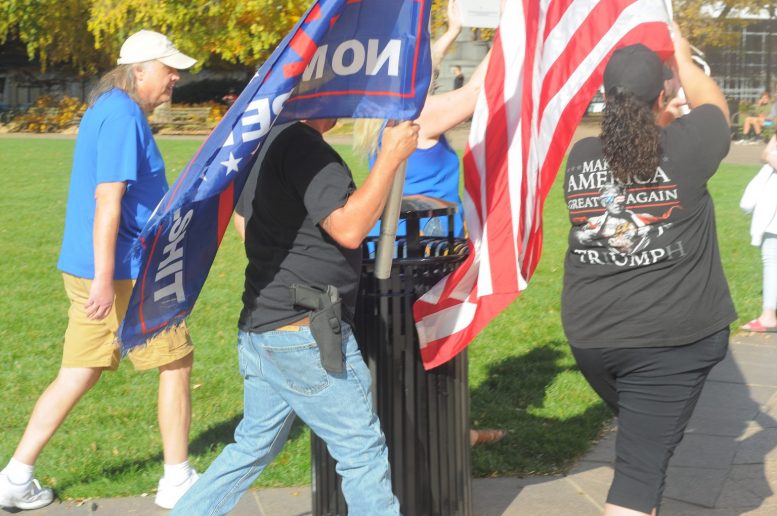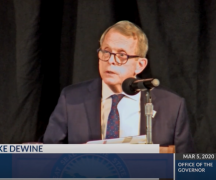Laws that expand the right to shoot to kill in perceived self-defense yield unequal consequences in the justice system depending on whether the person shot was white, according to research published Monday.
So-called “stand your ground” laws, one of which was passed in Ohio last year, are also associated with a modest to robust increase in violent crime rates in states that implemented them, according to findings published in the American Journal of Public Health.
There’s variation in the data. For instance, Florida, the first state to implement the idea in 2005, experienced a “robust” increase in violent crime rates, whereas the effect was more muted elsewhere.
“I think what we can really decisively say is there’s no positive effect of these laws,” said lead researcher Alexa Yakubovich in an interview. “There’s no evidence that these laws are reducing violence or reducing crime.”
Stand your ground policies typically remove in law what’s known as the reasonable duty to retreat. If a person is attacked in a stand your ground state, he or she has no legal requirement to first try to flee the situation before responding with gunfire.
Gov. Mike DeWine signed stand your ground into law in Ohio in January after a nearly 10-year push from the gun lobby. (State Sen. Theresa Gavarone, R-Bowling Green, and State Rep. Haraz Ghanbari, R-Perrysburg voted in favor of the legislation.)
The new research shows that not all claims of self-defense are treated equally. Juries are significantly less likely to deem a shooting to be a justifiable instance of self-defense when the victim is white.
“The exacerbation of racial equality, that’s all the evidence that we need in a lot of ways,” Yakubovich said. “That should be enough to weigh against these laws.”
To assess the impact of stand your ground, Yakubovich and her team conducted a meta-analysis of 25 studies (20 of which were peer-reviewed) on the effects of laws expanding civilians’ rights to use deadly force. They trawled several research databases for more than 20,000 studies, narrowing down the list for relevancy and scientific rigor. They also analyzed another seven studies looking at the outcomes of self-defense cases involving stand your ground in Florida.
Exactly how much violent crime increased due to the policy is less clear. In Florida, some studies showed “robust” increases between 24% and 45% after stand your ground was implemented.
However, the largest estimate of the average increase on homicides (14%) came from a study that excluded Florida, suggesting it’s not just a unique phenomenon of the Sunshine State.
As stand your ground advanced through the legislative process in Ohio, a small handful of Republicans joined Democrats in opposing the idea. They argued it would enable a vigilante justice mentality. Similarly, Democrats argued the bill would disproportionately harm Black people, who are more likely to be perceived as threats and less likely to be believed by juries if they mounted a claim of self-defense in court.
Advocacy groups representing Ohio police officers and prosecutors opposed the idea as well.
Some Republicans sought to take the issue further, introducing legislation that would allow people to shoot their way out of a “riot” if they feel threatened by protesters.
The proposal, which did not become law, seemingly emerged in response to racial justice protests that formed around the world last summer after a white Minneapolis policeman placed his knee on the neck of George Floyd, an unarmed Black man, ultimately killing him.
While a vast majority of the thousands of subsequent protests were peaceful, some of the first demonstrations around the U.S., including in Columbus and Cleveland, turned destructive and chaotic.
Supporters of the stand your ground, including the gun lobby, say the policy corrects a legal perversion in which a person who is attacked has a legal duty to flee. They say the duty to retreat can quickly turn victims into suspects if they fail to adequately seek an escape.
Stand your ground laws exist in 25 other states, plus another eight more by virtue of court rulings. Yakubovich said between the disparate treatment under the policy on racial lines and the increase in violent crime rates, lawmakers should consider repealing the law.
She said the law is pushed by entities with political and financial agendas, not empirical analysis.
“I think the people pushing for stand your ground are not doing it on the basis of evidence,” she said. “These laws were modeled and pushed by the [National Rifle Association].”



